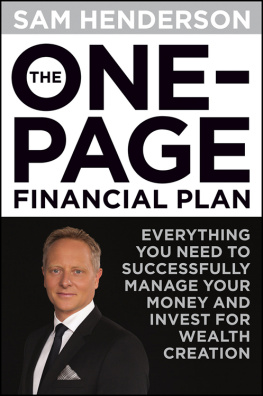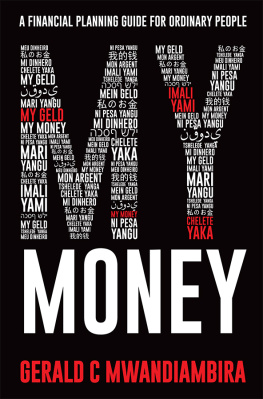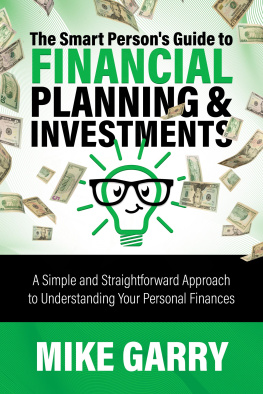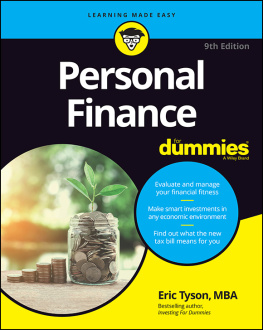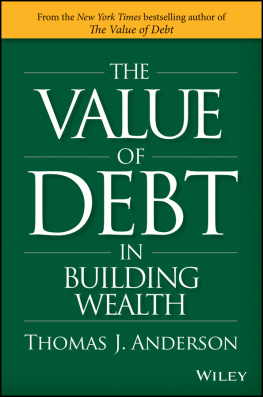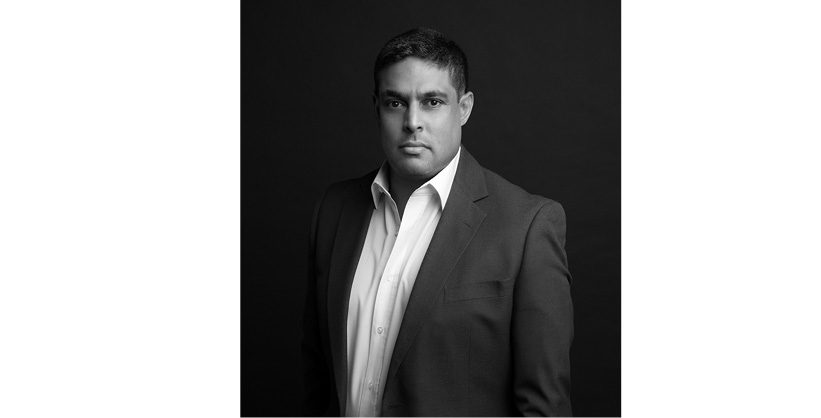The moral right of the author has been asserted.
Apart from any fair dealing for the purposes of research or private study, or criticism or review, as permitted under the Copyright, Designs and Patents Act 1988, this publication may only be reproduced, stored or transmitted, in any form or by any means, with the prior permission in writing of the publishers, or in the case of reprographic reproduction in accordance with the terms of licences issued by the Copyright Licensing Agency. Enquiries concerning reproduction outside those terms should be sent to the publishers.
Leicestershire. LE8 0RX
British Library Cataloguing in Publication Data.
A catalogue record for this book is available from the British Library.
Profile
Sandeep Ghosh CII (Award), ACSI, MLIBF Dip FA is a British-born financial consultant based in Dubai, UAE.
Since 2007, Sandeep has been managing investment portfolios for clients across Europe and the Middle East and North Africa (MENA) regions.
He is a qualified member of the Chartered Insurance Institute (UK) CII Award. He is a qualified associate of the Chartered Institute for Securities & Investment ASCI. He is a qualified member of the London Institute of Banking and Finance MLIBF Dip FA. |
Born in London, the son of an accountant father, he spent his early career in trade finance for projects across the MENA region before moving into financial services, having developed a passion and curiosity for the investment world.
Today, Sandeep manages multi-asset portfolios for a large number of clients across major multi-nationals including Emirates Airlines, ADNOC, Majid Al Futtaim, PWC, Deutsche Bank, HSBC, Microsoft, Shell, the World Bank and Emaar. He is also heavily involved in providing pension transfer advice to UK expats around the world.
Preferring a holistic approach with all clients, whether middle, high or ultra-high net worth, Sandeep uses his experience and qualifications to address all key areas of financial planning, whether it be UK tax liability, pensions, insurance, investments or estate planning.
He has a strong inclination towards rescuing malfunctioning portfolios through his knowledge of the various asset classes and how they work an area he finds most rewarding, especially where the client has been poorly advised historically. Alongside a strong understanding of the traditional modes of investment, be they Exchange Traded Funds (ETFs), mutual funds, bonds or derivatives-based solutions, Sandeep has a keen eye on the new wave of options, brought on by the FinTech revolution. He is a strong believer in the evolution of financial services, knowing that some traditional means of wealth generation will become obsolete, replaced by new, more appealing and transparent concepts.
Sandeep spends his time mostly between London and Dubai, where he lives with his wife, Indrani, and daughter Rohini, practising as a senior consultant for a major brokerage. In his spare time, his great passions are studying all forms of music, writing, travelling, trying to master the guitar, exploring all manner of dining options and playing golf (only in cool, cloudy weather). Most precious to Sandeep is the ability to be able to spend quality time with his family and friends in London.
You can contact Sandeep at:
www.thewealthlounge.com
Acknowledgements
This book is dedicated to my wife, Indrani and daughter Rohini
Also:
To my parents in Northwood and Kolkata
To my extended family
Thank you for your love and support.
Prologue
Today, in the early 21st century, we are witnessing a seismic revolution in the financial services industry, where the worlds population has unmasked the long-established control of money as dated, unfair, dictatorial and untrustworthy. The mechanism of trade, transactions, borrowing and investing, and the way they are conducted, is mutating or being altogether usurped by seemingly fairer and transparent systems. Pioneering companies and individuals are sweeping through innovative alternatives to cash and traditional banking, reforming and radicalising the way we manage our wealth, giving society control over its own fortunes. With this new wave, we require new skills, including the ability to understand risk and the different asset classes. However, as we enter this era, we find a middle class that in their majority are debt-ridden and alarmingly short of their savings targets. Somehow, many of them project a sense of comfort, yet are locked in the manacles of a precariously flawed routine. Sleeping through such crises and overlooking the newly paved routes to wealth will likely lead to financial devastation and defeat in the battle against time racing to survive, but struggling to survive the race. The time has come to wake up to wealth.
Knowing Where We Stand
Having spent some years working in wealth management and planning, I write this book out of both passion and frustration. It is the frustration of seeing people with tremendous financial potential graze through life, wasting opportunities, oblivious to the time bomb that awaits later. The ominous outcome fuels my passion to add to the already numerous wake-up calls across the financial media and politics. Our responsibility for our personal finance is just that a responsibility to oneself, ones loved ones and to society in general. It is the backbone of the progress civilisation has witnessed so far. However, equilibrium in global wealth and end of poverty, that level playing field transcending nations and races, can only ever start where the value of money and its usefulness in society is properly understood. Starting in our very homes, we can do our bit to ensure the burden of our financial security doesnt eventually fall on others. Involving ourselves economically in a healthy way, be it with investment or debt, will only help relieve societal scarcity and will prompt the distribution of wealth to the corners where it is needed, raising our own standards of living, and in doing so, allowing those less fortunate the chance to lift their own communities out of hardship. However emotive and utopic a subject this may be, this book is very much focused on us as individuals and how and why we should wake up to the idea of taking full monetary control of our lives. It all starts with you.
Whatever your occupation, nationality or social status, the principals of financial planning and wealth management remain constant, unaltered by culture, race, religion or career. If youre part of a society where lifes needs come at a cost, youll require financial planning. Ive been managing wealth in and from the Middle East now for several years, advising individuals from middle management right through to business magnates, creating portfolios that run into the many millions of dollars, but my style and pattern of providing the advice rarely changes. Of course, for an industrialist worth many millions, there may be wider considerations and many more options available than for a lower income earner, but the framework and elementary design of a financial roadmap stays the same. Why? The reason is because the size of your assets is secondary to your age, your health, your liabilities and your objectives, ergo the human life cycle. It is upon this frame that we then add the clay to design and tweak the desired solution. So, this book, although mainly dealing with basics, will enable readers regardless of their present status to understand the key guidelines for wealth management and asset preservation. I do however make an assumption that, although you have a general idea of how personal finance and investing works, you havent yet taken a structured approach or are lost in the process. I also make the assumption that youre on your own in this journey (including a partner or spouse if applicable), without external dependence on parents or the like. Being a male adviser myself, I have often slipped into the masculine third-person singular pronoun to save time and space. At the same time, I may refer to financial planning as personal finance in some areas, and adviser as consultant. There are certain subjects which have overlapped or are referenced in more than one chapter, which is due to the very nature of the industry, where all elements are interconnected.



